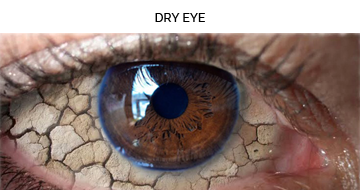
DRY EYE
No. This might be the symptom for Dry eye. You should consult your ophthalmologist to get your eyes checked and treated.
- A stinging, burning or scratchy sensation in your eyes.
- Stringy mucus in or around your eyes.
- Sensitivity to light.
- Eye redness.
- A sensation of having something in your eyes.
- Difficulty wearing contact lenses.
- Difficulty with nighttime driving.
If you have any of the above symptoms then you need a Dry eye examination by your ophthalmologist.
Treatment usually depends on the severity of dryness. Topical eye drops are sufficient in treating the symptoms and improve the vision.
Currently, there is no permanent cure for dry eye disease. However, a number of options can help maintain moisture in the eyes. These can reduce symptoms and protect vision.
Since dry eye can lead to complications that impair your vision and quality of life, consider seeing an eye doctor if your symptoms don't improve. Prolonged symptoms could indicate a more severe case of dryness.
Mild to moderate dry eye disease without any ocular surface abnormality doea not cause blindness, but only decreases the clarity of vision. But if there is severe dryness due to corneal scarring or other ocular surface disease, then it might lead to serious complications.
Dry eyes can cause differences in the length, symptoms, or severity of headaches experienced by an individual. If someone is prone to headaches, they may be triggered by changes in the eyes, including dry eye symptoms.
These symptoms generally last three to six months, but may last longer in some cases. Dry eye can result from chemical and thermal burns that scar the membrane lining the eyelids and covering the eye. Allergies can be associated with dry eye.
Your eyes get dry when they don't make tears properly or when the tears dry up too quickly. Dry eyes can be caused by allergies, medications, certain medical conditions, hormones, and, yes, age.
The exact cause of chronic dry eye is unknown. External factors may aggravate dry eye symptoms, including conditions common in many workplaces such as prolonged computer use and exposure to air conditioning, heating, dust and allergens.
Some people with chronic dry eye notice that their symptoms become worse at night. There could be a variety of reasons for this, including fatigue from using your eyes all day, changes in your metabolism at night, and certain medical conditions.
Topical drops to be continued as long as the symptomatic relief is not there , however three to four months minimum is required . Sometimes prolonged usage is advocated for severe cases of dry eye.